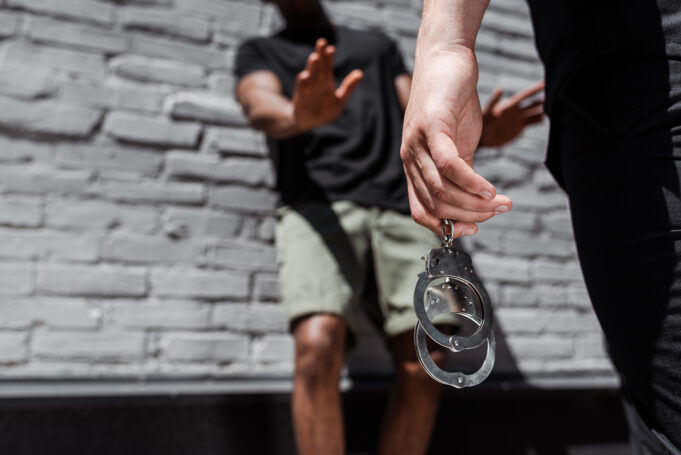WASHINGTON, D.C.—Brian Hemphill was walking down the street in southwest D.C. when he heard a police siren. The squad car pulled up next to him and the police stopped him. They conducted a common practice called “stop-and-frisk” primarily used to get guns off the street.
“They told me to get against the fence,” Mr. Hemphill told The Final Call. “I’m asking them, ‘Hey, why am I being stopped?’ They said they got a call that somebody had a gun and I fit the description. They actually searched me. They went in my pockets, went through my pants.
I think the thing that really kind of made them leave me alone this time was because I saw a really nice flower that I had picked and put in my pocket. Instead of them finding a gun, they pulled a flower out of my pocket. That’s when they let me go,” Mr. Hemphill continued.
“I would say in my lifetime, I’ve been stopped probably like three or four times. What they usually say is they got a call about somebody with a gun, and every time I was let go because I don’t carry a gun.”
Mr. Hemphill joins the thousands of Black D.C. residents who were disproportionately stopped and frisked by the Metropolitan Police Department (MPD).
The ACLU and D.C. ACLU analyzed the city’s 2022-2023 stop-and-frisk data in a recent report entitled “Bias at the Core?: Enduring Racial Disparities in D.C. Metropolitan Police Department Stop-and-Frisk Practices.”
While Blacks account for 70 percent of people stopped in the District, according to the data, they are only 44 percent of D.C.’s total population. In contrast, the report found that Whites were only 39.6 percent of the city’s residents in 2022, yet were involved in only 12.7 percent of stops that year and slightly less than 12 percent in 2023.
The study examined MPD records from January 1, 2022 to December 31, 2023, for a total of 136,805 stops. During this two-year period, law enforcement conducted stops at a rate of approximately one person per 10 minutes. The findings indicated that the disproportionate targeting of Blacks in MPD’s stop-and-frisk operations represents a pattern of racial bias.
“It’s time for District leaders to truly question why they uphold stop-and-frisk practices that lack community safety benefits—especially when these practices implicate people’s constitutional rights, can be traumatic to Black and Brown communities, and erode trust in the criminal justice system,” ACLU-D.C. Policy Advocacy Director Scarlett Aldebot said in a statement.
“Instead of leaning into harmful and ineffective policing, the District should build a public safety system that protects us from bias, increases trust in government, and keeps all our communities safe.”
The MPD responded by explaining that of the almost 69,000 stops in 2022, 4,471 (less than seven percent) included a protective pat down, and one percent included a consent search.
The ACLU-D.C. report also questions the effectiveness of these stops. In 2022, MPD officers found guns in fewer than one percent of these stops. In 2023, officers found guns in 1.2 percent of stops.
That explanation doesn’t sit well with retired MPD Officer Glen Holland. He told The Final Call, “The original purpose of the stop and frisk was basically to protect police officers when they approached someone to make sure they didn’t have any weapons. I think since over the years it has expanded much further than what it was intended for this use.”
“I don’t know why they continue to use it, if the courts have said it was some kind of violation of civil rights. They shouldn’t be using it, but I don’t know why they continue to use it.”
A 2016 Washington, D.C., statute mandates that the MPD gather data on the frequency of stop and frisk searches. The ACLU-D.C. has examined this data for the third time, concluding that D.C. law enforcement is not making progress in this area. The organization argues that these searches are detrimental to both the police force and the local community.
“There is a power dynamic at play, even if you know you weren’t doing anything at all. The fact that a police officer is approaching you can be very nerve-racking,” Ms. Aldebot said.
Stop and frisk has been a nationwide problem from Boston to Chicago to Newark and New York City which, according to the report, was the “poster child” for stop and frisk. Between 2004 and 2012, the New York Police Department (NYPD) made 4.4 million stops under its citywide policy.
The report explained that more than 80 percent of the people stopped in New York were Black and Latino. At the peak in 2011, about 685,724 people were stopped in a year, with nearly 88 percent found to be innocent.
A 2014 report by the New York Civil Liberties Union found that Black and Latine males aged 14–24 were the subjects of 41 percent of stops between 2003 and 2013.
The report explains that stop-and-frisk practices can be harmful to individuals and communities. People subjected to police stops and searches face various consequences, both immediate and enduring.
These range from health-related effects, including considerable mental distress, to societal repercussions, such as detrimental impacts on educational and career prospects.
Anthony Muhammad serves on the Citizens Advisory Council in the city’s 7th District. He told The Final Call, “Stop-and-Frisk should be abolished.
Stops should be justified and reasonable not just because I didn’t look right, or I had on a hood, or I had on a mask. I want to have my constitutional rights protected and recognized even though I’m Black.”













